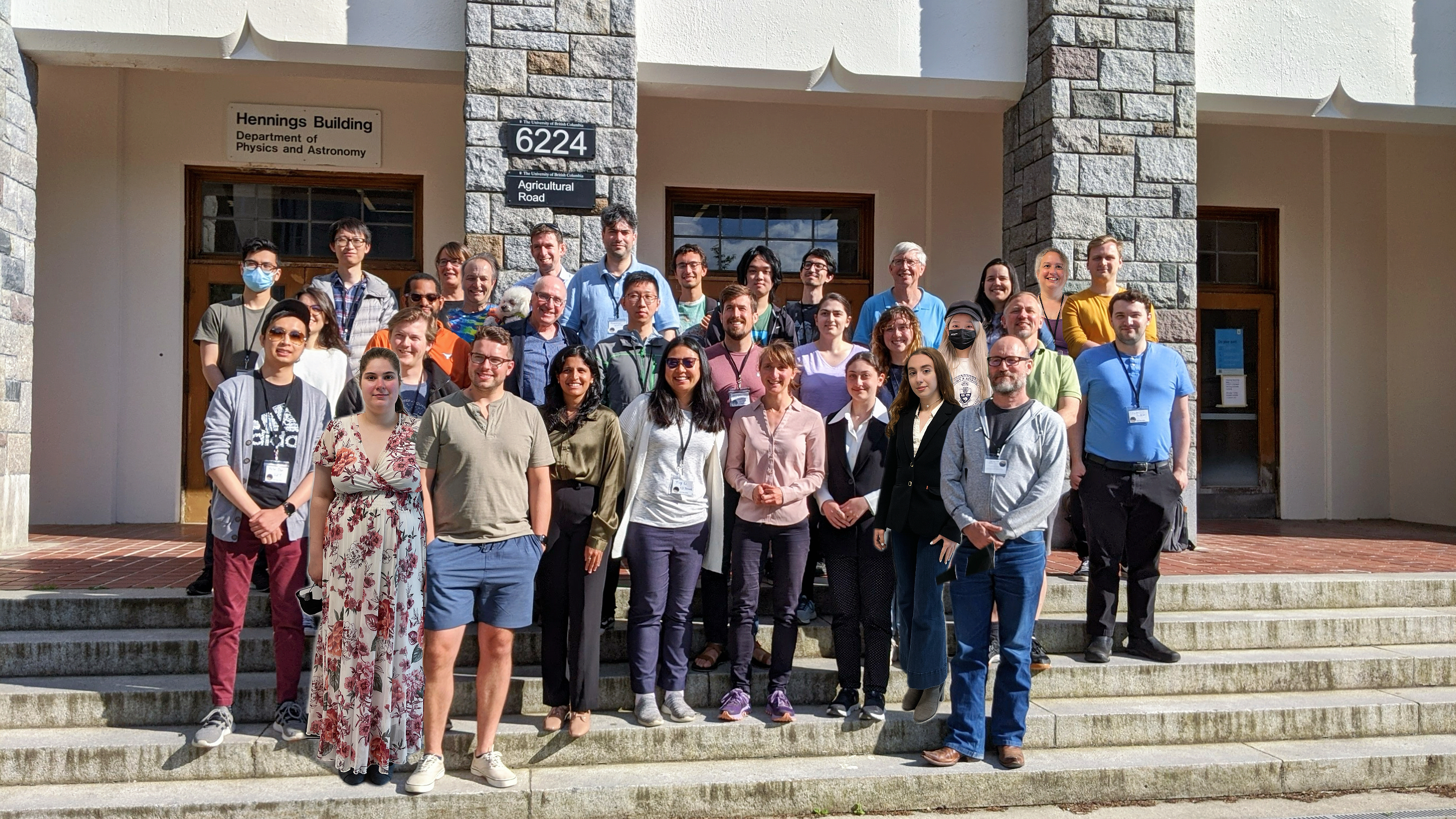Gaia Hike 2022

University of British Columbia, Vancouver, BC, Canada
Funded and supported by the Canadian Institute for Theoretical Astrophysics (CITA)
WHAT ➜ Modelled on the Gaia Sprints, a gathering of Canadian scientists across the observational-theoretical spectrum interested in Gaia science
WHY ➜ A chance to gather thoughts and start new, long-term collaborations at the release of Gaia DR3
WHERE ➜ University of British Columbia, Vancouver, Canada
WHEN ➜ June 20-24, 2022
WHO ➜ The organising committee, contactable via this email address.

Let’s be puzzled together!
Many scientific results have come out of Gaia previous data releases, from
asteroids to planets to Galactic and extra-galactic research areas. What
questions are left to address with the later data releases of Gaia and beyond?
Gaia Hike originates from, but branches out of, the traditional Gaia Sprints
and shares part of the Sprint mindset and objectives. The goal is for the
Canada-wide community interested in scientific questions that can be addressed
by using Gaia DR3 data, to assemble and brainstorm, share their expertise and
tools, write down ideas, hack, stare at plots and scratch their heads.
The Hike is not a traditional scientific meeting: there will be no (or few)
talks and will be designed to enhance the benefits of collaborative thinking
and form new long-term collaborations. The Hike won’t be a Sprint either:
the goal is to form and start collaborations, long term thinking will be
encouraged (including the ‘after Gaia’ era), and publications resulting from
work performed at the Hike may only be seen as a possible “side product”
rather than a goal.
If you are a theoretician but never dared ADQL-ing or interpreting features
that look like artifacts, this is a chance to meet daily Gaia users! If you
made a plot with Gaia DR3 and need a physical model to interpret it, this
is your chance to meet theoreticians!
Collaboration Policy
In addition to a general Code of Conduct, we require participants to agree
to the Original Gaia Sprint Collaboration Policy that ensures transparency
and openness at the meeting:
All participants at every Gaia Sprint will be expected to openly share their
ideas, expertise, code, and interim results. Project development will
proceed out in the open, among participants and in the world.
Participants will be encouraged to change gears, start new collaborations,
and combine projects. Any participant who contributes significantly to a
project can expect co-authorship on resulting scientific papers, and any
participant who gets signficant contributions to a project is expected to
include those contributors as co-authors.
These rules make it inadvisable to bring proprietary data sets or proprietary
code to any Sprint, unless the participant bringing such assets has the
rights to open them or add collaborators.
Acknowledgements
If you write up any work that started or was (partially) developed at the Gaia Hike and publish it, please remember to include the following acknowledgements:
This project was developed in part at the Gaia Hike, a workshop hosted by the University of British Columbia and the Canadian Institute for Theoretical Astrophysics in 2022 June.
Ce projet a été développé partiellement durant la réunion Gaia Hike (Randonnée Gaia) accueillie par l’Université de Colombie Britannique et financé l’Institut Canadien d’Astrophysique Théorique en juin 2022.
Latex version:
Ce projet a \’{e}t\’{e} d\’{e}velopp\’{e} partiellement durant la r\'{e}union Gaia Hike (Randonn\’{e}e Gaia) accueillie par l’Universit\’{e} de Colombie Britannique et financ\’{e} l’Institut Canadien d’Astrophysique Th\’{e}orique en juin 2022.
In addition, please make sure that you properly acknowledge the Gaia and DPAC teams, in accordance with their credit and citation instructions.
Organisers
| SOC | LOC | Advisory Board |
|---|---|---|
| Neige Frankel (Chair, CITA Toronto) | Jeremy Heyl (Chair, UBC) | Juna Kollmeier (Director, CITA Toronto) |
| Ted Mackereth (CITA Toronto) | Brett Gladman (UBC) | David w. Hogg (NYU / CCA) |
| Julio Navarro (CITA Victoria) | Hans-Walter Rix (MPIA, Heidelberg) | |
| Alan McConnachie (U. Victoria) | Scott Tremaine (CITA Toronto) | |
| Christian Hayes (U. Victoria) | ||
| Aarya Patil (U. Toronto) |
Schedule & Maps
The detailed schedule is available here. This map shows the location of the meeting (Hennings Building), the bus stop for the Wednesday hike/outing, the Gage Suites residence for those of you who have signed up for joint housing (refer to the Accomodation section), and food options.
Preparation
Before you arrive, we would like you to complete the following set of homework:
Homework 1
Make a business card (= 1 slide) by Friday, June 17 at this link and prepare a 1-min speech to introduce yourself (using the business card as a support)
Homework 2
Be ready to bring and discuss at least one of the following by Monday, June 20:
- An important Gaia result (from you or in the literature) from previous Gaia releases
- A plot you made with Gaia DR3
- A clear summary of one of the Gaia DR3 release papers
Also remember to bring:
- Relevant material: your own dongles for projector, any code/dataset you want to share
- Your hiking gear if you plan to hike
Workshop material
The following are links to material that was produced at the hike, namely:
Frequently Asked Questions
Absolutely! The Gaia hike is specifically designed to involve and include early-career scientists, and hope that everyone, no matter their career stage, will learn something and has something to contribute! While we want to encourage applicants to tell us what tools/datasets they would be happy to provide short workshops/tutorials on, this is definitely not a requirement to attend. However, we want to emphasise that almost everyone will have some tool or data that they can teach others, possibly without even realising it! We do however want you to complete the assigned homework (refer to the Preparation section), since it is meant to facilitate discussions.Are undergraduate and graduate students welcome?
Do I have to give a talk or a contribution?

